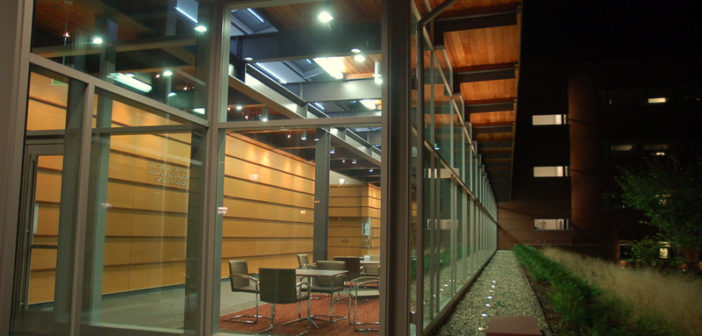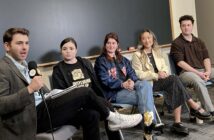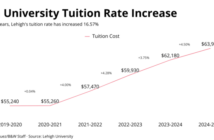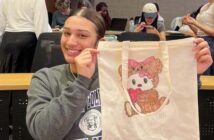In an effort to revise the College of Arts and Sciences’ general education requirements, a committee was formed last spring by CAS Dean Robert Flowers, following numerous calls to revamp the current curriculum.
Since March, Amanda Brandone, associate professor of psychology, and Stephen Peters, associate professor of earth and environmental sciences, have acted as the committee’s chairs, meeting regularly with the eight other members to look closely at how general education requirements can be improved to better reflect the university’s changing landscape.
“The college set this curriculum over 20 years ago,” Brandone said. “The world has changed and the needs of students have changed—we need to be responsive to that.”
The committee has spent much of the fall semester formulating new mission and vision statements for the College of Arts and Sciences.
Although the mission and vision statement for the College of Arts and Sciences has not yet been released, the committee’s goal is “to lead the college in developing a coherent, thoughtful, 21st-century general education curriculum that reflects the college’s mission and values.”
The committee plans to have a new curriculum in place by the start of the 2023-24 academic year.
“It’s a marathon, not a sprint.” Peters said. “We want there to be plenty of opportunities to listen and to hear from all the constituencies: the students that are going through it, the faculty that have to teach it, and the administrators who have to support it.”
Currently, the College of Arts and Sciences requires students to complete ENGL 001 and 002 (or ENGL 011), a first-year seminar, three credits of mathematics, eight credits of arts and humanities, eight credits of natural sciences with one lab component, and eight credits of social sciences in order to be eligible to graduate.
While the committee wants students to continue working outside of their comfort zones and receiving a broad education, Brandone said it wants to avoid the “check-box approach” where there’s a lack of intentionality in choosing courses.
“The goal of the distribution requirements is not to just check boxes and get these courses out of the way,” Brandone said. “The goal is to learn something unique about different ways of thinking.”
While many suggestions for revision have come from faculty members, the committee is also looking to hear students’ personal experiences with the general education requirements.
Isabel Heslin, ‘21, an anthropology and classical civilizations double major, has conflicting opinions on the program.
“Personally, I don’t have an issue with getting my humanities and social sciences done because my majors cover a lot of those, but having to take a math (course) when my majors have nothing to do with it is frustrating,” Heslin said.
To continue these student conversations, the committee developed a survey for students to voice their opinions about the existing system and share their ideas for the future.
Brandone said the committee is interested in hearing from students about what parts of their general education courses they have found most valuable, what challenges they have faced in completing their requirements, and any ideas they have for how the general education program could be more impactful.
As the committee continues its revision process, it hopes to create a curriculum that does not simply follow a series of check boxes, but rather offers a collection of courses that build towards a broader knowledge base that students can take with them into the future.
“I think we’ll have been successful if students and faculty look at this as an opportunity and not as a checklist,” Peters said.






Comment policy
Comments posted to The Brown and White website are reviewed by a moderator before being approved. Incendiary speech or harassing language, including comments targeted at individuals, may be deemed unacceptable and not published. Spam and other soliciting will also be declined.
The Brown and White also reserves the right to not publish entirely anonymous comments.
4 Comments
“Personally, I don’t have an issue with getting my humanities and social sciences done because my majors cover a lot of those, but having to take a math (course) when my majors have nothing to do with it is frustrating,” Heslin said.
I would think that the members of the College of Arts and Sciences’ general education requirements committee might also have frustration at Ms. Heslin’s comment.
Appropriate math courses are a necessity as part of a well rounded education.
I agree. There is no excuse why a student should not at least take “calculus 1” or “survey of calculus” to have a deeper appreciating for the foundation of modern science. It is the same reason why I would want students from P.C Rossin to take a level 300 humanities course.
Except that an International Relations major has no practical need for a calculus course in the same way that a Mechanical Engineering student has no need to take a level 300 humanities course, such as ENGL 360 Middle English Literature (Major literary works of the Middle English period by authors other than Chaucer. Emphasis on Piers Plowman, the Gawain/ Pearl Poet, and the metrical romances.). That could be a fantastic class but one with little practical effect in rounding out an engineering student’s wholistic eduction informed by their major and professional goals. As a Political Science and International Relations double-major, I routinely proofread engineering students’ writing, which was abysmal across the board and reinforced to me that their humanities requirements should focus on developing better professional writing skills so that they can graduate to be the best engineers they can be. Instead of taking an introductory geology or astronomy class to fulfill my science requirement, I probably would have been better served taking a course about the intersection of science and health with social and political issues. These distribution requirements should be informed by students’ then-current and eventual professional needs.
1. Holistic, not wholistic.
2. Knowing what calculus is is important to understanding what the 20th century was. While a “here, do calculus” course may not be practical, a history of mathematics and computation is crucial. If you want to arts it up, you could read Gravity’s Rainbow alongside the math-history lectures.
3. If you’re doing IR/PS work, be more curious about science. If nothing else, the sci classes you took began introducing you to scientific languages and ways of thinking, and made it possible for scientists to communicate reasonably with you.